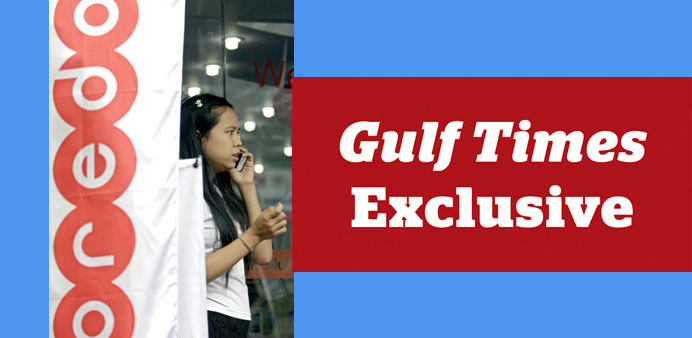A Burmese woman talks on mobile next to a banner of Ooredoo outside a mobile shop in Yangon, Myanmar (file). Ooredoo, for which Myanmar is a key expansion market in Asia besides Indonesia, has committed to a nationwide geographic coverage of 84% (both voice and data) and a population coverage of 96% five years after obtaining the licence.
By Arno Maierbrugger/Gulf Times Correspondent /Bangkok
In one for Myanmar very rare cross-border financing deal, a telecom infrastructure company based in Yangon will obtain $60mn from Islamic financing to build and lease 1,250 telecommunication towers for Qatar’s mobile phone operator Ooredoo, which entered the market in the Southeast Asian country by obtaining a licence in 2013 and subsequently launched voice and data services in August 2014.
The firm, Myanmar Tower Company (MTC), is a unit of Singapore-based Digicel Asian Holdings, a joint company of globally active mobile phone network provider Digicel owned by Irish businessman Denis O’Brien, Yoma Strategic Holdings, a Singapore-listed, Myanmar-focused firm chaired by prominent Myanmar tycoon Serge Pun, and Pun’s investment company First Myanmar Investment.
The structure of the deal is quite complex. Due to regulatory issues, MTC’s parent company in Singapore will receive the Islamic financing mostly from Middle East investors. At a later point of time, it is planned that MTC will replace the Singapore company and get access to the funds.
It is one of the few cross-border financing deals for Myanmar that took place since the country opened its borders for foreign investors in 2011, and the first-ever Islamic finance cross-border deal for majority-Buddhist Myanmar, according to a statement by UK-based multinational law firm Clifford Chance which together with Doha-based investment firm QInvest was advising on the deal.
Reportedly, there could be more such Islamic finance deals if this one turns out to be viable enough.
There are a number of Myanmar tycoons who own holdings or financing companies in Singapore, and Ooredoo has to build an entire new network more or less from scratch. It is partnering with Digicel to set up the telecom infrastructure after the Jamaica-based company, despite being backed by multibillionaire investor George Soros, failed to secure a licence on its own in Myanmar’s mobile phone licence auction back in 2013. Ooredoo, for which Myanmar is a key expansion market in Asia besides Indonesia, has committed to a nationwide geographic coverage of 84% (both voice and data) and a population coverage of 96% five years after obtaining the licence.
After starting commercial operations in August 2014, Ooredoo’s network initially covered the country’s three main cities Yangon, Mandalay and the capital Naypyitaw and is now being extended to 68 other towns. As of March, Ooredoo had sold more than 3.3mn pre-paid SIM cards in Myanmar and has also introduced data services.
For Singapore, the Islamic finance deal for Myanmar is a sign that the city state has not totally abandoned its ambitions to become another Islamic finance centre in East Asia. Competing with Hong Kong, Singapore has succeeded in attracting some Islamic finance companies and advisories and also a Shariah-compliant Real Estate Investment Trust in the past, but the Islamic finance business is still more or less confined to small finance firms and has yet to take off on a larger scale, e.g. through large government-issued sukuk or by developing the widely untapped Islamic private banking market in Asia.
Like Hong Kong, Singapore has an AAA sovereign credit rating and a very favourable tax system which could easily attract more Islamic investors to the city state.

